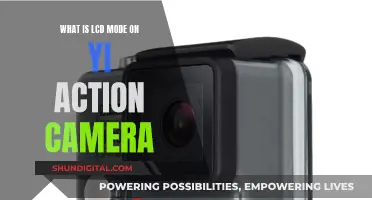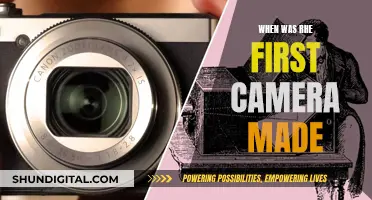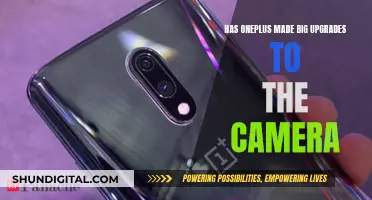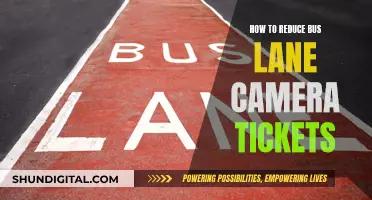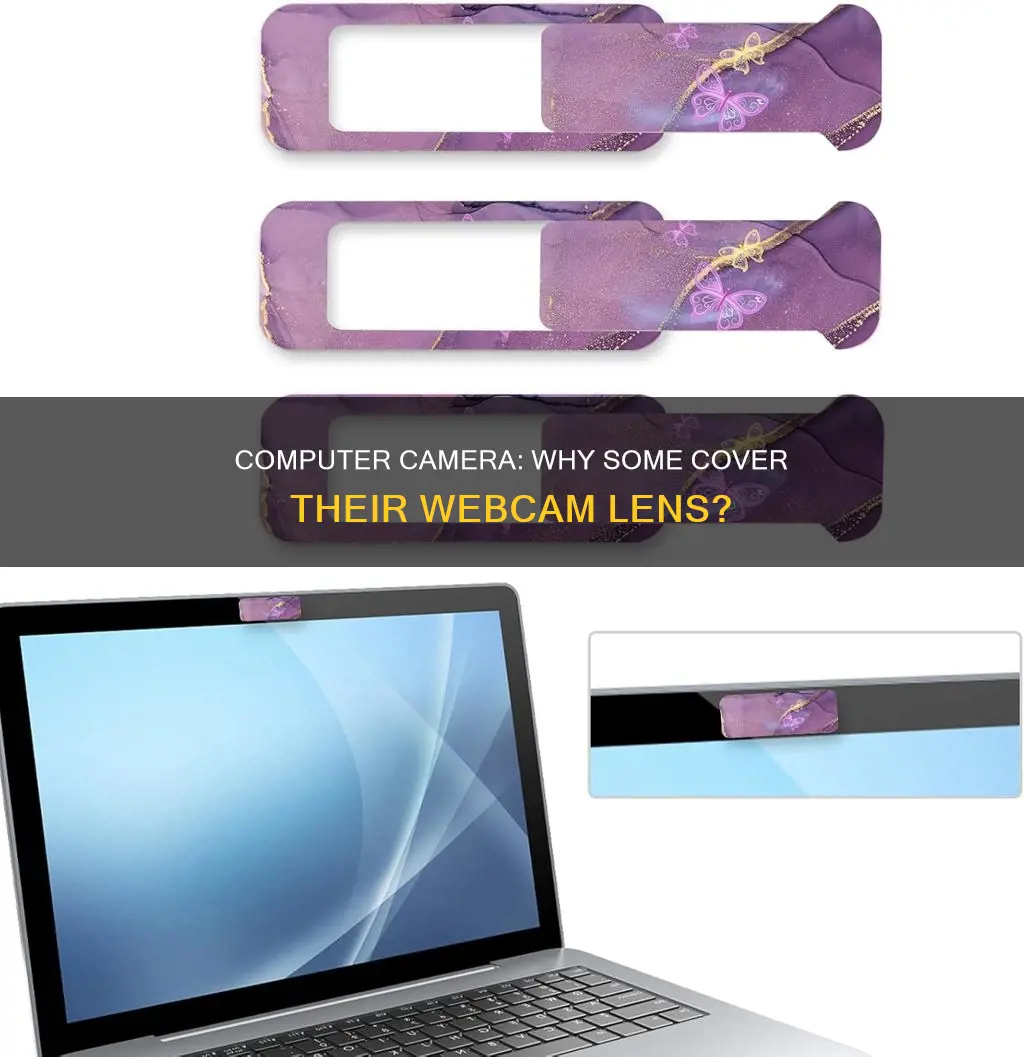
In today's tech-driven world, it is easy to compromise our privacy. If hackers can penetrate the White House, they can likely crack our personal devices. Many people, including the former head of the FBI, cover their laptop cameras with tape to prevent hacking. This is because laptop and tablet cameras can be hacked without their owners' knowledge, usually with a remote administration tool (RAT) which can account for over 70% of all trojans, a type of malware that hides on PCs to track online activity and take control of the device. Hackers can use malware to access cameras when users accidentally click a bad link or download a sinister file.
| Characteristics | Values |
|---|---|
| Reason for covering | To prevent hacking and surveillance |
| Type of covering | Tape, Post-It, paper, stickers |
| Type of device | Laptops, computers, smartphones |
| Camera features | Indicator light, internal microphone |
| Camera usage | Videoconferencing, surveillance, advertising |
| Preventative measures | Antivirus software, spyware scans, privacy settings |
What You'll Learn

To prevent hackers from accessing their device
Covering your webcam is a simple and effective way to prevent hackers from accessing your device and spying on you. This practice has become increasingly common, especially after the COVID-19 pandemic, which saw a massive shift to remote work and a subsequent increase in video conferencing.
While it may seem paranoid, the threat of camera hacking, or "camfecting", is very real. Hackers can use various methods to access your webcam, such as remote-access Trojan malware, which can be unknowingly downloaded through phishing emails or messages. Once downloaded, this malware grants hackers complete remote access to your camera. Additionally, unprotected webcams or those with weak passwords are easy targets for attackers.
By simply covering your webcam with a piece of tape or a sticker, you can ensure that even if a hacker gains access to your camera, they won't be able to see anything. This method is endorsed by cybersecurity experts and is a simple and cost-effective solution.
However, it's important to note that this only protects your camera. To fully secure your device, you should also consider other measures, such as keeping your software and firmware up to date, using strong and unique passwords, avoiding suspicious links and attachments, and installing reputable antivirus and anti-spyware software.
By combining camera covers with comprehensive security measures, you can effectively prevent hackers from accessing your device and protect your privacy.
Inverting Radial Filters in Camera Raw: A Step-by-Step Guide
You may want to see also

To avoid potential spying via their camera
Webcams and phone cameras can be hacked, giving malicious actors control over how they function. As a result, hackers can use a device’s camera to spy on individuals. This can be prevented by taking certain measures.
How to prevent potential spying via your camera
- Laptop webcam privacy covers are small pieces of plastic that fit over your camera and can be slid open or shut. While closed, they prevent the camera from seeing anything, even if it is turned on.
- Turning off your laptop or phone when it is not in use will also prevent hackers from using your camera. However, a hibernating or “sleeping” device may still be vulnerable.
- General cybersecurity best practices will help ensure a hacker isn’t using your camera. Knowing how to tell if your computer is infected is essential.
- If your webcam light turns on or flashes when you’re not using it, that could be a sign it’s being accessed by a hacker or malware. If you notice this happening, check your device’s camera permissions to see which apps and services are using it. Disable permission for any app or service you don’t want using your camera.
- Monitoring your phone or computer for unusual storage files, strange network activity, and unknown applications may also help you spot the after-effects of malware.
- For Windows, built-in tools like Windows Defender can help. Ensuring your antivirus is running regular scans should protect your computer from most threats, as long as you avoid suspicious links and files while browsing the web.
- On Mac, consider enabling Firewall. This built-in feature blocks connections from the internet and other devices to unauthorized apps and services, which can help prevent camera-spying malware.
- If your system seems to have a virus that your antivirus can’t catch, you can bring your computer to a trusted repair store or cybersecurity expert for a closer look.
Signs that you are being spied on via your camera
- If your camera light is on when you are not using it, it may be a sign that someone is spying on you.
- If you are using an iPhone, a green dot appears at the top right corner if the camera is being accessed.
- If you are using an Android phone, you can download an app called Access Dots from the Google Play Store which will notify you when the camera or microphone is being accessed. It imitates the iPhone's camera and microphone dots.
- If your phone's camera is misbehaving, e.g., turning on automatically, it may be a sign that someone is accessing it to watch you.
- If you notice strange apps, photos, or video files that you don't remember downloading or capturing, it may be a sign that someone has accessed your phone.
- If your phone is losing battery power quickly without any explanation, it may be a sign of malware running in the background.
Hooking Bunker Hill Surveillance Cameras to Your TV
You may want to see also

To stop companies from accessing their camera for advertising
Some people hide their computer cameras to prevent companies from accessing their camera for advertising. In our tech-driven world, it is evident that our privacy can be easily compromised. If hackers can penetrate the White House, they can likely crack our personal devices. Many modern devices capable of connecting to the internet have cameras. There is a possibility that someone is looking for money or a glimpse of your intimate moments. This has led to a thriving black market for compromised webcams and the photos or videos they can produce.
In 2014, the FBI conducted its largest cyber operation, arresting webcam hackers in over 12 countries. The program, called Blackshades, allowed users to steal passwords to victims' online accounts and activate their web cameras to spy on them. Many Internet-connected webcams have their own IP address, which allows for remote access from anywhere in the world. However, if your camera is not protected by a strong password (which many are not), it is much easier for hackers to infiltrate.
Computer-connected webcams can be accessed by hackers using malware, which can be accidentally installed by clicking a bad link or downloading a malicious file. Criminals have collected embarrassing pictures of people via webcam and then asked for money. Therefore, if you do not want people watching your every move, the only way to protect yourself is to cover your camera when it is not in use.
Additionally, websites and apps often ask for permission to access your camera, and over time, you may have granted permission to dozens of websites without realising. It is a good idea to go into your settings and revoke permissions for any websites or apps that you do not want to have access to your camera.
Locate Microphones: Do Computers Have Built-In Mics?
You may want to see also

To avoid the risk of malicious software turning on their camera
Hiding one's computer camera is a common practice to protect oneself from malicious software that could turn on the camera. This is known as "camfecting", where hackers distribute malware through phishing attacks to gain remote access to a camera.
Hackers can install malware and gain access to computer cameras, allowing them to view and record footage without the owner's knowledge or consent. This poses a serious threat to privacy and security, as hackers can then use the footage for blackmail, identity theft, or other malicious purposes.
Another critical measure is to avoid clicking on suspicious links or downloading files from unknown sources. Phishing schemes and fake security pop-ups are common tactics used by hackers to trick users into installing malware. It is important to be cautious when receiving such messages and to verify the legitimacy of any links or attachments before proceeding.
Utilizing security software, such as antivirus programs and firewalls, provides an additional layer of protection. These tools can detect and block malware, helping to secure personal information and prevent unauthorized access.
Covering the camera with tape, a sticker, or a webcam cover is also an effective method to ensure privacy. Even if malware gains access to the camera, the physical barrier prevents any visual data from being captured.
By following these precautions, individuals can significantly reduce the risk of malicious software turning on their computer cameras and protect their privacy and security.
Best Sensor Sizes for Outdoor Surveillance Cameras
You may want to see also

To protect their privacy
In today's tech-driven world, it's easy for our privacy to be compromised. If hackers can penetrate the White House, they can likely crack our personal devices. Many modern devices are capable of getting online and have built-in cameras. There is a probability that someone is looking for money or a glimpse of your intimate moments. This has made way for a thriving black market for compromised webcams and the videos or photos they can produce.
In 2014, the FBI ran its largest cyber operation to date, arresting webcam hackers in more than 12 countries. The program, called Blackshades, gave users access to photographs and other files on the victim’s computer, as well as control of their web camera to spy on them. There is also some evidence to suggest that the FBI has hacked into people’s computers to access their webcams for surveillance.
Many Internet-connected webcams have their own IP address to permit remote access, which lets users connect directly from anywhere in the world. However, if your camera is not protected by a strong password (which many are not), it is easier for hackers to infiltrate.
Hackers can also use malware to access cameras. This can happen when a user accidentally clicks a bad link or downloads a sinister file. There are plenty of trojans that can spy on you via your computer’s camera. Criminals have even been known to ask for money from victims after collecting embarrassing pictures of them via webcam.
It is not paranoia to want to protect your privacy by covering your camera when not in use. In fact, it is recommended by computer security experts.
Hacking Surveillance Cameras: Sleeping Dogs Guide
You may want to see also


